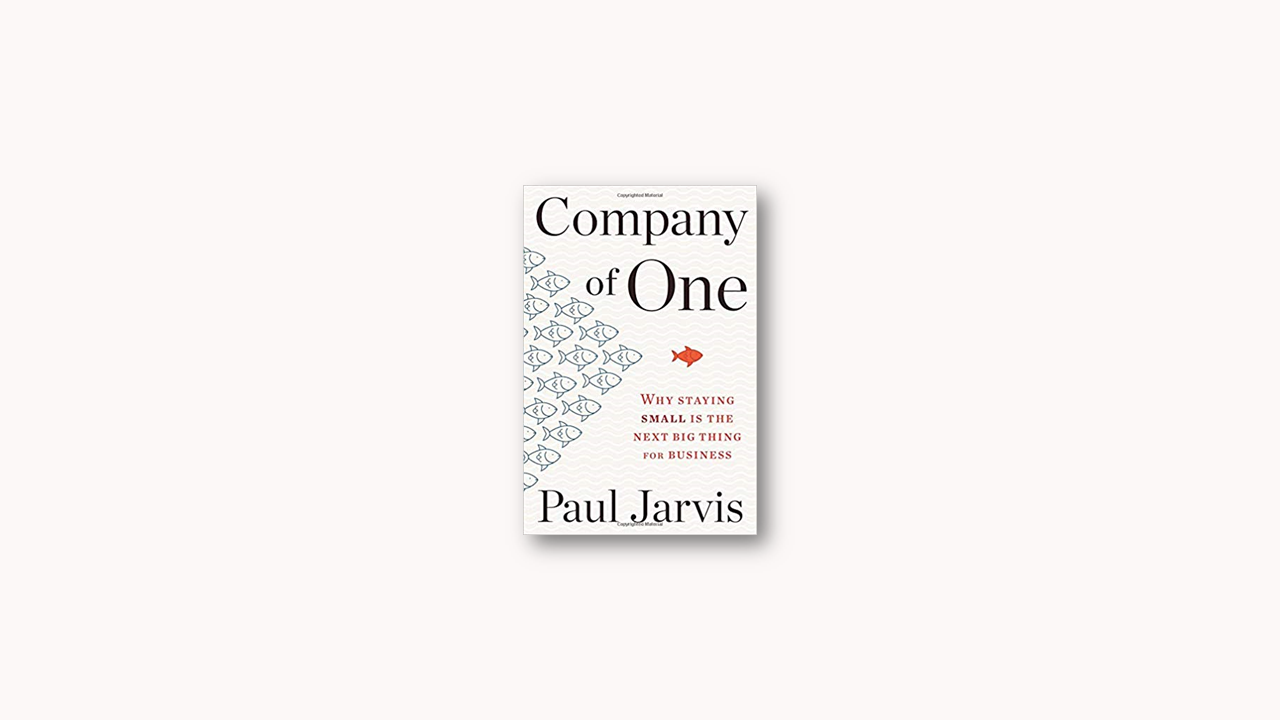Business is a choice we make and one choice isn’t better than any other.
All are simply choices guided by our own subjective internal factors. The company of one present one choice. It may not be the choice you want to run your life and your business, but if it is, the book will give you both compelling stories and author’s first-hand insights to guide you.
There’s only one rule for being a company of one. That is to stay attentive to opportunities that require growth and question them before taking them. – Paul Jarvis
Even large and established companies aren’t immune to the perils of chasing the infinite growth.
Starbucks, Krispy Kreme and Pets.com all pursued undisciplined aggressive scaling and have paid a steep price. Starbucks was opening hundreds of stores around the world but decided that it could scale faster by adding sandwiches, CDs and fancier drinks to its offerings. This rapid line extension ended up diluting Starbucks brand and resulted in an equally rapid contraction, forcing the company to close 900 stores.
It was only when Starbucks returned its focus to doing it’s one thing – coffee – but better. It renewed its efforts to recapture a boutique coffee shop experience by upgrading machinery, retraining staff and getting rid of superfluous products. Starbucks learned the hard way that better isn’t always bigger.
Often, the best plan is to focus on your customer success, not chasing leads and growth.
Sometimes finding and working with a single customer, then adding another, then another is a very useful and solid way to begin. And sometimes that can even be the end goal – one where your focus is on the relationship and the paid work at hand.
Pat Riley, the Hall of Fame basket ball coach, coined the term ‘the disease of more’. He noticed time and time again winning players, just like some start-ups, focused on more instead of better. Once they won, they let their egos get in the way ahead of tasks that helped them win in the first place – like practice and focus. Instead they become lured into more endorsements, more accolades and more media attention.
From the marketing standpoint, you’re better off having 100 passionate brand evangelists than having 100,000 followers who simply follow to win a free iPad. Unfortunately, metrics large corporations measure don’t always correlate with sales, profit or reputation. That is, they don’t measure engagement or trust – they simply show how many people took some form of marketing bait.
A company of one has one big advantage over the large corporations – customer service.
The CEO of Excalibur Screw Bolts, still regularly answers the phone at his small office. The founders of Basecamp do the same and attend to technical support requests. CD Baby has no voice mail routing systems and the phone can be answered by anyone for CEO to people in the warehouse.
Rackspace is a technology company that provides on-demand cloud computing service (similar to AWS). One day, their call center representative heard someone in the background of a support call mentioning he was hungry. She quietly put the customer on hold, ordered a pizza and went back to assisting with his problem. 20 minutes later, still one the phone with the customer, she heard a knock in the background and told him to go answer the door, saying “It’s your pizza.” The pleasant unexpected experience led to not only a very happy customer but also a story that went viral online.
It’s not just the e-commerce companies that go to great lengths for their customers. Take a look at Trader Joe’s, an American grocery chain for example. Once an elderly man was snowed in and stranded in his rural home during the holidays. His out-of-town daughter found out and began calling grocery stores to deliver foo to him. None of the stores offered home delivery, and that was when she called Trader Joe’s. The employee said it was not Trader Joe’s policy to deliver but given extreme circumstances they’d gladly get food delivered to her father. After she provided the list, the employee even suggested additional items to fit her father’s low-sodium diet. The employee even said not to worry about the payment. 30 minutes later, the order was at their father’s house, having cost nothing. Empathy in business can sometimes just being a caring human being.
As a company of one, your word is your social contract.
Be very careful in what you say or promise. It doesn’t do you any good to over-promise or pitch false information, even unintentionally. In thee days, when almost all information is available online, you need to be clear about what your business does and doesn’t. For trust to be totally baked into every aspect of not only what you sell, but how you support it, it’s crucial to align your action with your words.
Hugely successful innovations have come out of hackathons.
In a hackathon, a fusion of hack and marathon, several small teams of developer’s designers and project managers, take on a large project over the course of several hours or a few days. Facebook’s Like button for example, is a product of hackathon. Hackathons ca be fun, energetic and highly productive since everyone is working towards a common goal and purpose.
One of the most effective ways to build your customer base is to educate them.
When you teach your customers about their primary interests, trust is the natural outcome. Basecamp used to spend around $1 million on social media ads until they found these ads weren’t as effective as what they were doing already – creating and sharing educational content. So, they decided to use that advertising budget on building great products, ramping up their customer service and incentivizing existing customer base.

